Dealing with child custody evaluations during a divorce can be one of the most stressful parts of the process.
It’s important to stay calm, be honest, and show that you’re a capable and loving parent.
The evaluator is there to help decide what is best for your child, so cooperating with them is crucial.
To make a good impression, always arrive on time and be prepared to discuss your child’s needs and your parenting abilities.
Organization and clear communication will show that you take your role seriously.
Remember, this evaluation is about finding the best situation for your child, not about proving that you’re better than the other parent.
Stress and anxiety are natural, but don’t let them overwhelm you.
Take care of yourself by getting enough rest and support.
Practicing patience and staying focused on your child’s well-being will help you through this challenging time.
Understanding Child Custody Evaluations
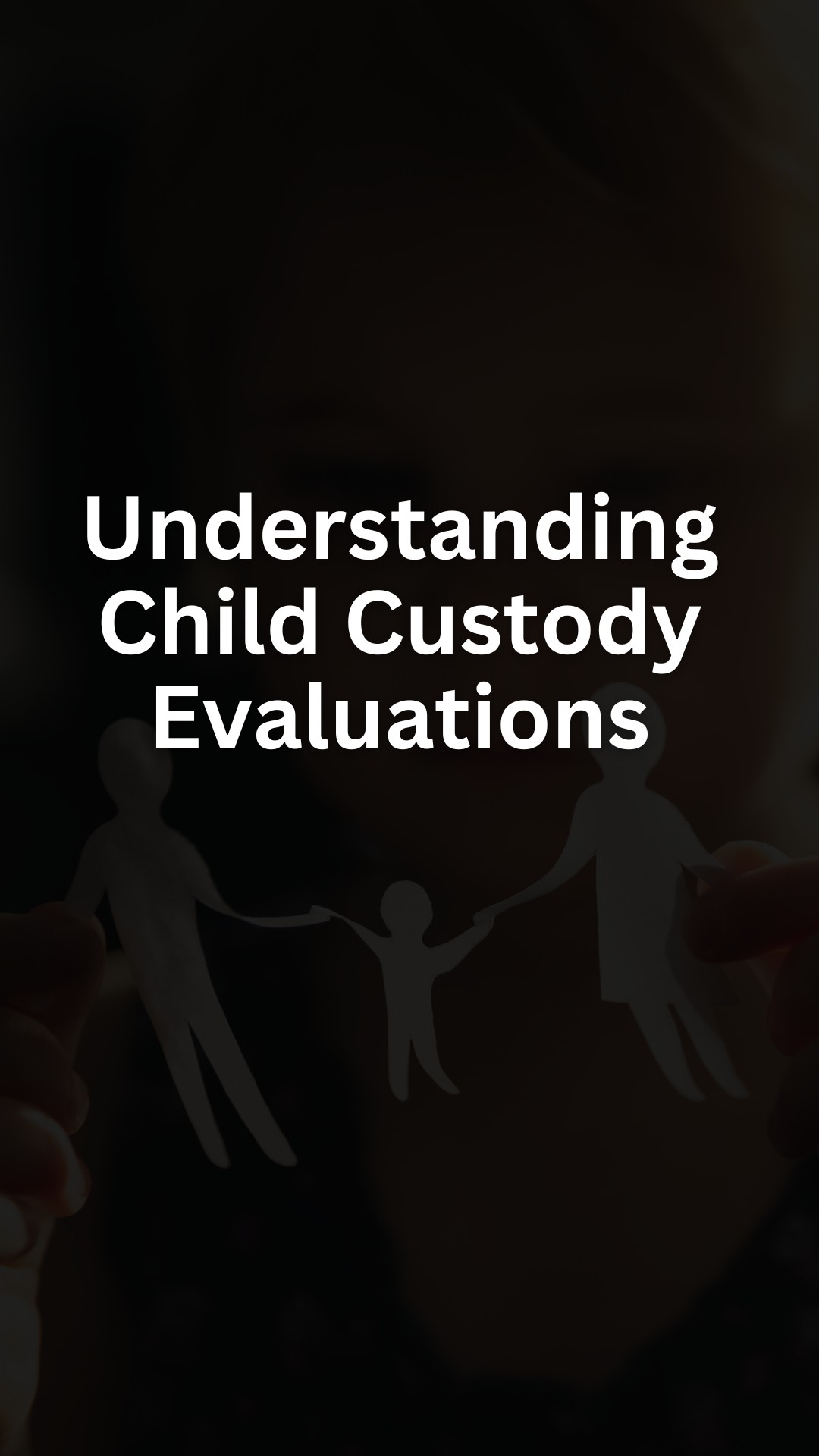
Child custody evaluations help decide the best living situation for your child.
These evaluations are done by a professional, such as a psychologist or social worker. They will meet with you, your child, and the other parent.
What to Expect:
- Interviews: You’ll be asked about your relationship with your child and the other parent.
- Observations: The evaluator may watch how you interact with your child.
- Home Visits: The evaluator might visit your home to see the environment.
Important Documents:
- School records
- Medical records
- Any relevant legal documents
These documents help the evaluator understand your child’s needs and your ability to meet them.
Tips to Prepare:
- Be honest and open during interviews.
- Keep your home environment safe and welcoming.
- Support your child emotionally during this time.
Your attitude and cooperation can impact the evaluation results.
Preparing for the Evaluation Process
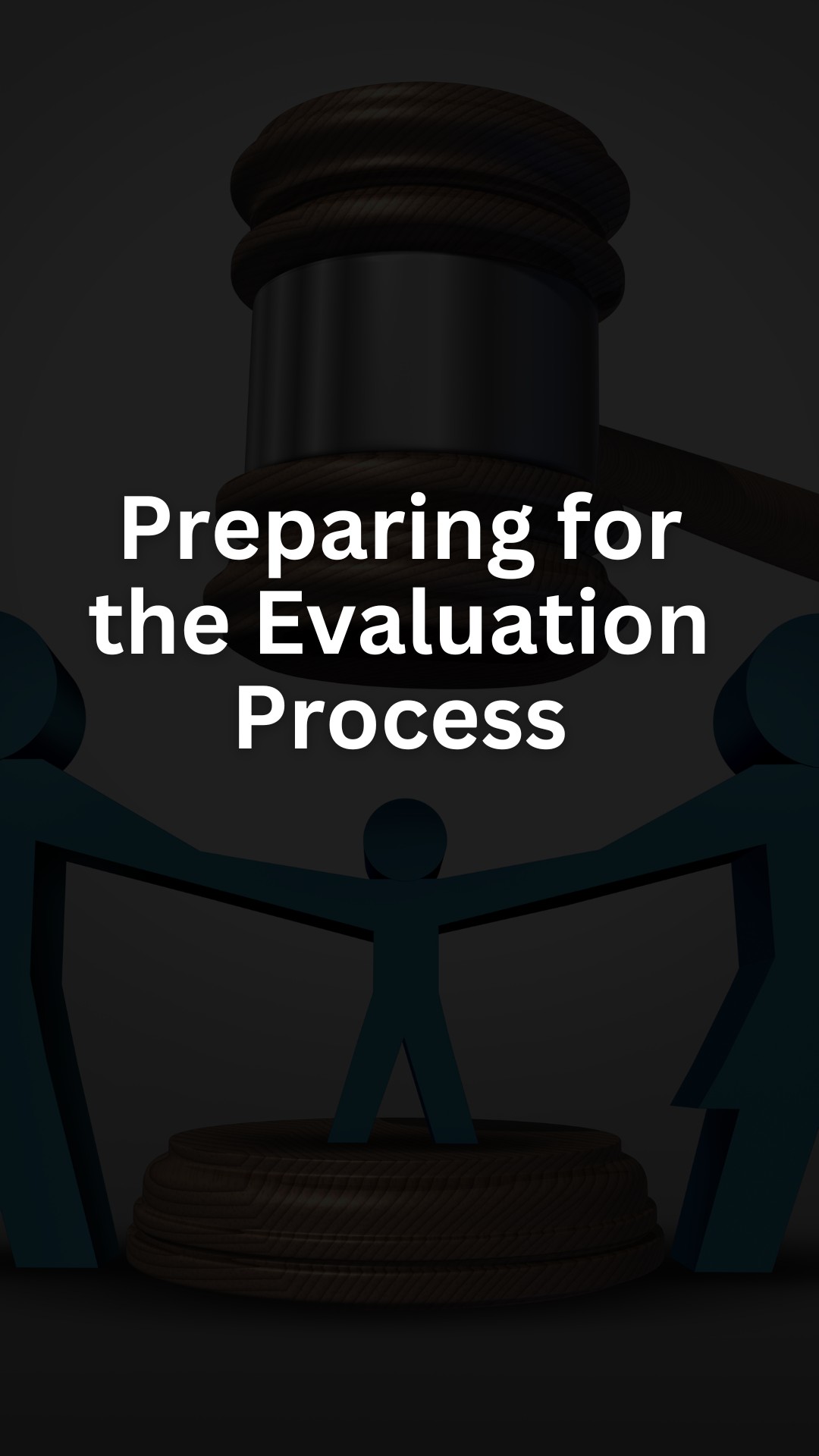
Getting ready for a child custody evaluation might seem hard. Taking steps to prepare can help you feel more confident and stay focused.
First, gather important documents. This includes school records, medical records, and any other relevant paperwork. Keep everything organized and easy to access.
Next, stay honest and open. Evaluators look for genuine information. Trying to hide things can make them doubt you. Be upfront about any challenges you face as a parent.
Think about your child’s needs and routines. This could involve their daily schedule, favorite activities, and any special requirements they have. Knowing these details will help show you are attentive to your child’s needs.
Communicate clearly with the evaluator. Speak calmly and stick to the facts. If you disagree with your ex-spouse, avoid negative comments. Focus on your child’s best interest.
Dress appropriately for meetings. Wearing neat and professional attire shows you take the process seriously. It’s a simple way to make a positive impression.
Practice answering questions about your parenting. Consider questions the evaluator might ask, such as how you handle discipline or support your child’s education. Rehearse your answers so you can respond confidently.
Remember to stay calm and patient. The evaluation can be stressful, but keeping a level head will help you present yourself in the best light.
Legal Parameters of Child Custody Evaluations

When dealing with child custody evaluations, it’s essential to know how state laws shape the process and what the custody evaluator’s responsibilities are.
State Laws and Regulations
State laws play a crucial role in child custody evaluations. Each state has its own rules about how evaluations must be conducted.
Some states require evaluators to have specific qualifications, like being a licensed psychologist or social worker. In many cases, states have guidelines that outline the evaluation process, including interviews and observations.
Courts rely on these evaluations to make decisions in the best interest of the child.
It’s vital to understand the specific requirements in your state, which may involve mandatory training for evaluators and adherence to confidentiality rules. Knowing these details helps you navigate the legal landscape more effectively.
Role of the Custody Evaluator
Custody evaluators are professionals who assess the family situation to provide recommendations to the court.
They might interview parents, children, and other relevant parties, and observe interactions between family members. They also review documents like school records and medical reports.
Their goal is to provide an unbiased view that helps the court make informed decisions.
Evaluators look at factors such as the child’s emotional and physical needs, each parent’s ability to meet those needs, and any potential risks.
Child’s Best Interests

When dealing with child custody evaluations in a divorce, focusing on the child’s best interests is key. This involves looking at their needs, the relationship with each parent, and their own preferences.
Assessing the Child’s Needs
You need to identify what your child needs physically, emotionally, and developmentally. Assess their health, education, and emotional stability. Make sure each parent’s living situation is safe and supportive.
Children require a stable home environment. Evaluate if either home has any risks, such as substance abuse or unsafe living conditions.
A consistent routine is important. Check which parent can provide regular meals, homework help, and bedtime routines.
Parent-Child Relationship
The bond between you and your child greatly impacts their well-being.
Think about who is more involved in their daily activities. Consider school drop-offs, extracurriculars, and medical appointments.
Quality time and emotional support are essential. Identify which parent provides more nurturing and guidance.
Child’s Preference
If your child is old enough, their preference might influence custody decisions. Courts may listen to children’s voices, especially teenagers.
Talk gently with your child to understand their wishes without pressuring them.
Consider if your child has specific reasons for their preference. It could be related to school, friends, or comfort with one parent. Respect their feelings but balance them with their overall welfare.
Parental Conduct and Capacities
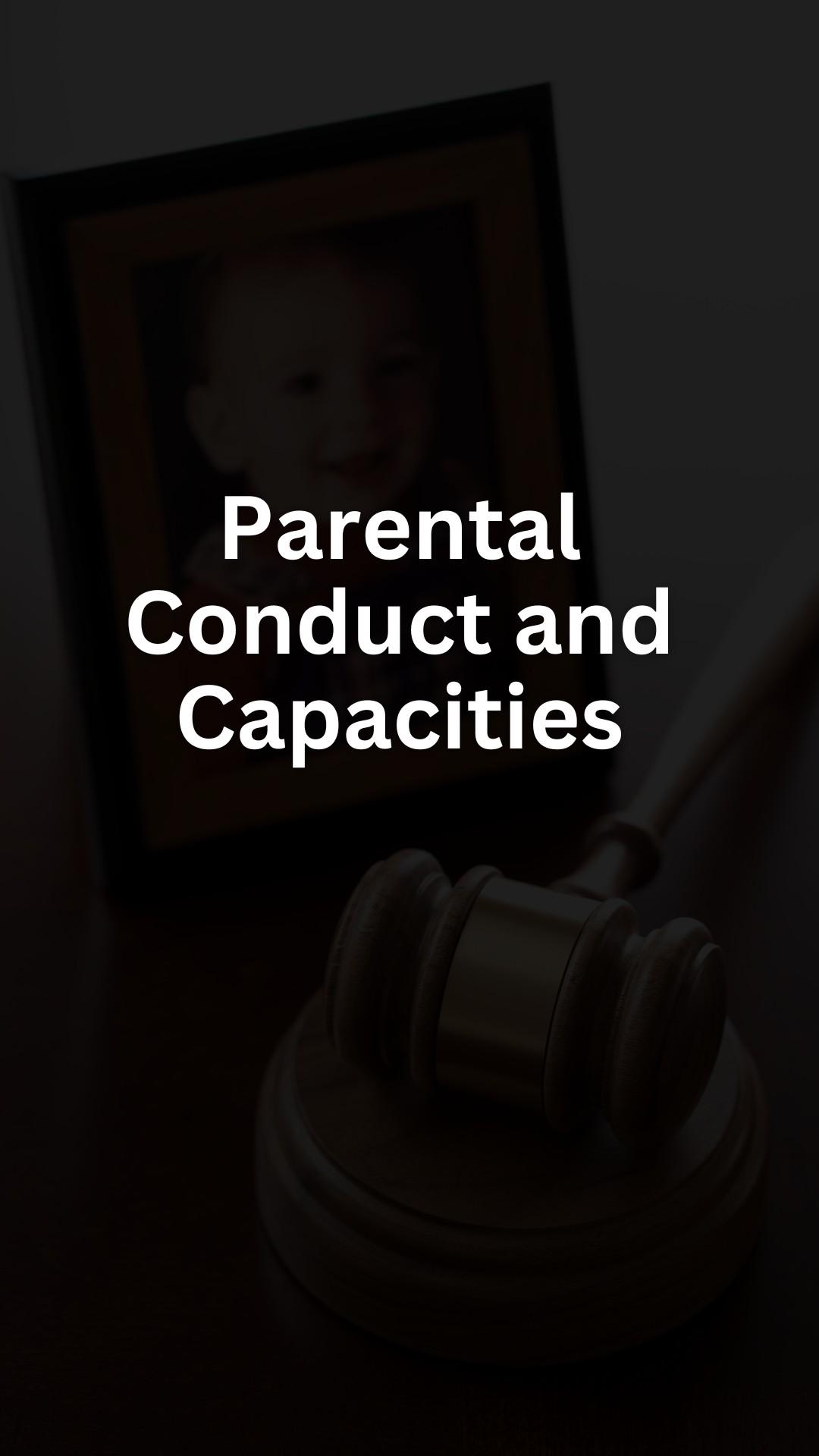
When evaluating child custody, your behavior and abilities as a parent are crucial. Key factors include mental health and any substance abuse issues.
Mental Health Considerations
Mental health plays a big role in child custody evaluations.
If you or your ex-partner have any mental health issues, it’s important to handle them responsibly. Consistent treatment with a therapist or counselor shows that you take your mental health seriously.
Tips for managing your mental health:
- Regular Therapy: Attend sessions regularly.
- Medication: Take prescribed medicines as directed.
- Support Network: Rely on friends and family.
A stable mental state can provide a safer environment for your child. Show evaluators that you can manage stress and emotions well.
Substance Abuse Issues
Substance abuse is another significant factor. Courts will look at your history with substances like alcohol or drugs.
If you’ve had issues, demonstrating recovery is key.
Steps to show you’ve addressed substance abuse:
- Rehabilitation: Complete a rehab program.
- Support Groups: Attend meetings like AA or NA.
- Testing: Be willing to take regular drug tests.
Sobriety shows you prioritize a safe environment for your child. Proof of long-term recovery can strengthen your case for custody.
Home Environment Evaluation

The home environment is a crucial factor in a child custody evaluation. It includes aspects such as safety, stability, and living conditions.
Safety and Stability
Your home should be a safe place for your child. Make sure there are no hazards, such as uncovered electrical outlets, dangerous chemicals, or sharp objects.
Stability is also important; your child should have a regular routine.
Consistency helps children feel more secure. They need a stable place to sleep, do homework, and play. Try to keep disruptions to a minimum, as frequent changes can be hard for kids.
Living Conditions
Inspectors will look at the general condition of your home. It doesn’t need to be perfect but it should be clean.
Remove any clutter and make sure all rooms are tidy.
Bedrooms should be personalized and comfortable to make the child feel at home. The house should have enough space for everyone.
Basic amenities like working plumbing and heating are also necessary. Importantly, food, clothing, and other essentials should be readily available.
Co-Parenting and Communication Skills
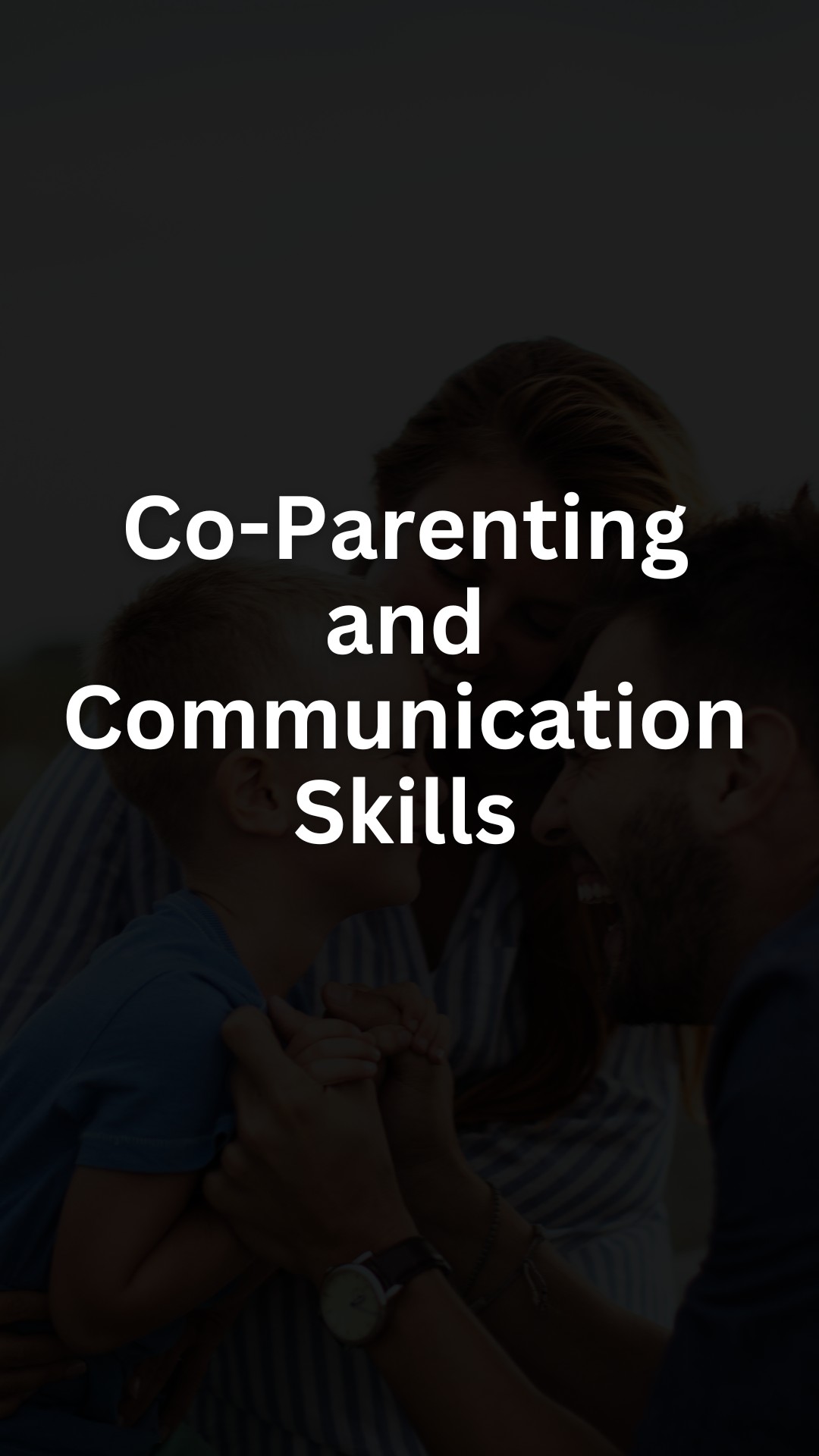
Co-parenting after a divorce can be challenging, but good communication can make it easier. You need to be able to talk to the other parent calmly and clearly.
Tips for Better Communication:
- Stay Positive: Speak respectfully to and about the other parent.
- Be Direct: Keep conversations focused on the needs of your children.
- Be Honest: Share important information about your children’s health, school, and activities.
Keep your emotions in check. Angry or hurtful comments can make things worse.
Using Technology:
- Messaging Apps: Use apps designed for co-parenting to keep track of schedules and messages.
- Shared Calendars: Tools like Google Calendar can help you both stay on the same page with dates and plans.
Sometimes, it might help to set boundaries on when and how you communicate. For example, you might agree to discuss only urgent issues late at night.
Effective Listening:
- Pay Attention: Really listen to what the other parent is saying.
- Show Understanding: Let them know you hear and understand their concerns.
- Ask Questions: If you don’t understand something, ask.
Focus on teamwork and don’t let personal feelings get in the way of parenting.
Documenting and Organizing Evidence
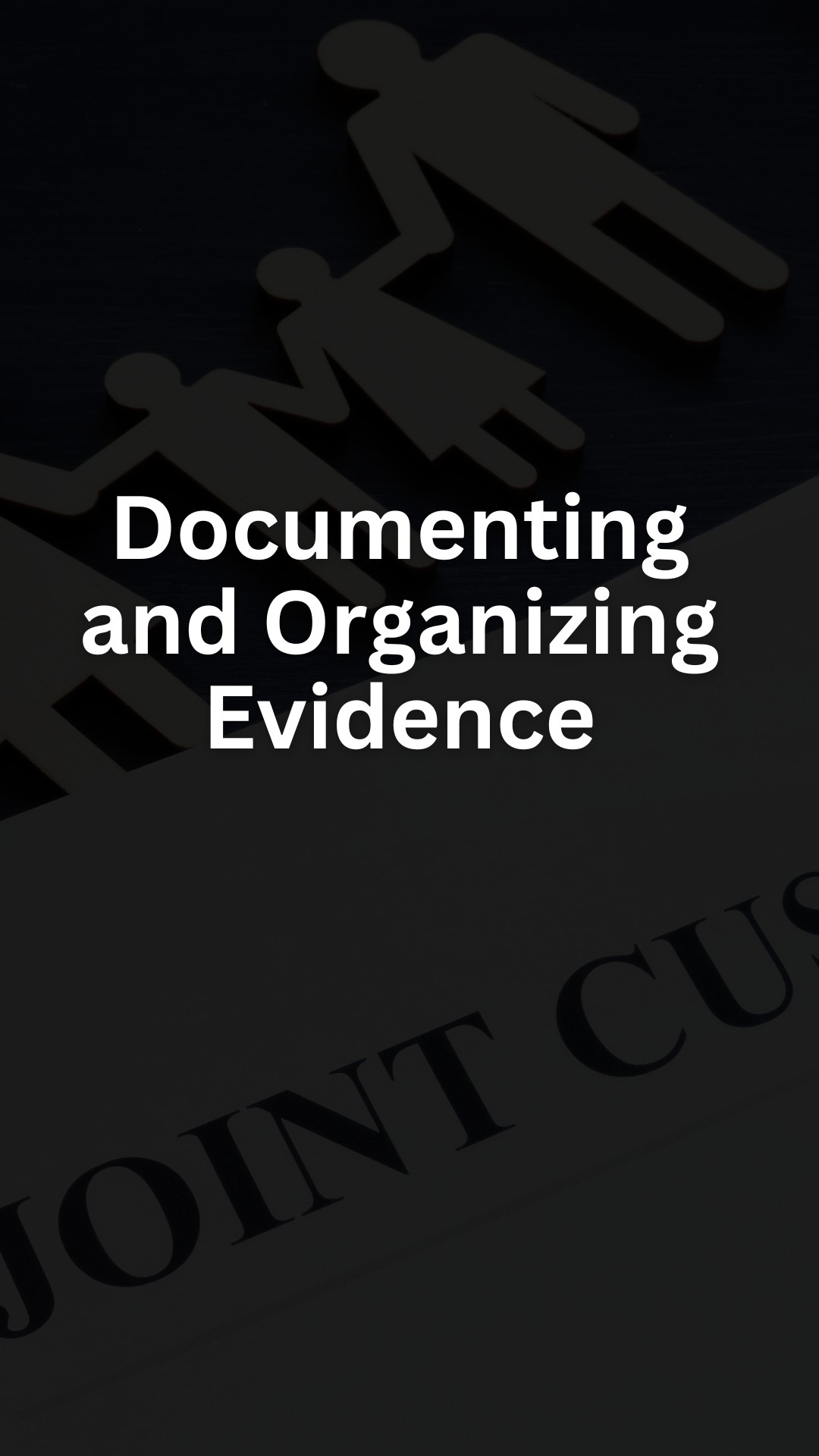
When preparing for a child custody evaluation, documenting and organizing evidence is crucial.
- Keep a Journal: Write down daily interactions with your child. Include dates, times, and details. A journal can highlight your involvement and commitment.
- Collect Relevant Documents: Gather important papers like:
- School records
- Medical records
- Photos of family activities
- Organize Financial Records: Include pay stubs, bank statements, and child-related expenses.
- Get Support Letters: Ask for letters from teachers, doctors, or friends. These can provide a broader picture of your parenting.
- Create a Calendar: Mark dates and times spent with your child. Show regular and meaningful contact.
- Label and Store: Use folders or binders. Label everything clearly for easy navigation.
Approaching Psychological Testing

Psychological testing can seem daunting, but with preparation, you can handle it smoothly.
Make sure you know what tests will be administered. Common tests include:
- Personality tests
- IQ tests
- Parenting assessments
Talk to your lawyer about these tests. They can guide you on what to expect and how to prepare.
Before the test day, get plenty of rest and eat well.
Your physical state affects your performance.
During the test, stay calm and be honest.
Nothing is worse than getting caught lying.
If your child is being tested, reassure them.
Let them know they just need to be themselves.
Here’s a quick checklist for you:
| Checklist for Psychological Testing |
|---|
| Know the types of tests |
| Talk to your lawyer |
| Get rest beforehand |
| Eat a good meal |
| Be honest |
| Reassure your child |
Strategies for In-Person Evaluations

When attending in-person custody evaluations, focus on presenting yourself positively and interacting well with your child. These strategies help demonstrate your parenting abilities effectively.
Interview Techniques
Be honest and direct during interviews.
Always answer questions thoughtfully.
Take a few seconds to think before speaking to ensure clear responses.
Show that you understand your child’s needs and always prioritize their well-being.
Maintain eye contact and a calm tone.
If you don’t know an answer, admit it rather than guess.
Share specific examples of how you support and care for your child, such as helping with homework or organizing activities.
Prepare by thinking about potential questions the evaluator might ask.
Reviewing past experiences can help you provide accurate information during the interview.
Also, stay polite and respectful, even if the questions feel invasive.
Interaction Observations
During interaction observations, focus on engaging with your child naturally.
Be attentive and responsive to their needs.
Demonstrating your ability to handle different situations calmly and effectively is crucial.
Play and talk with your child as you normally would.
Avoid putting on a show; evaluators can usually tell when interactions aren’t genuine.
Encourage your child to express themselves and support their interests.
Clear communication is key.
Speak calmly and explain things in a way your child understands.
Show patience and understanding, especially if they become restless or upset.
Post-Evaluation Steps
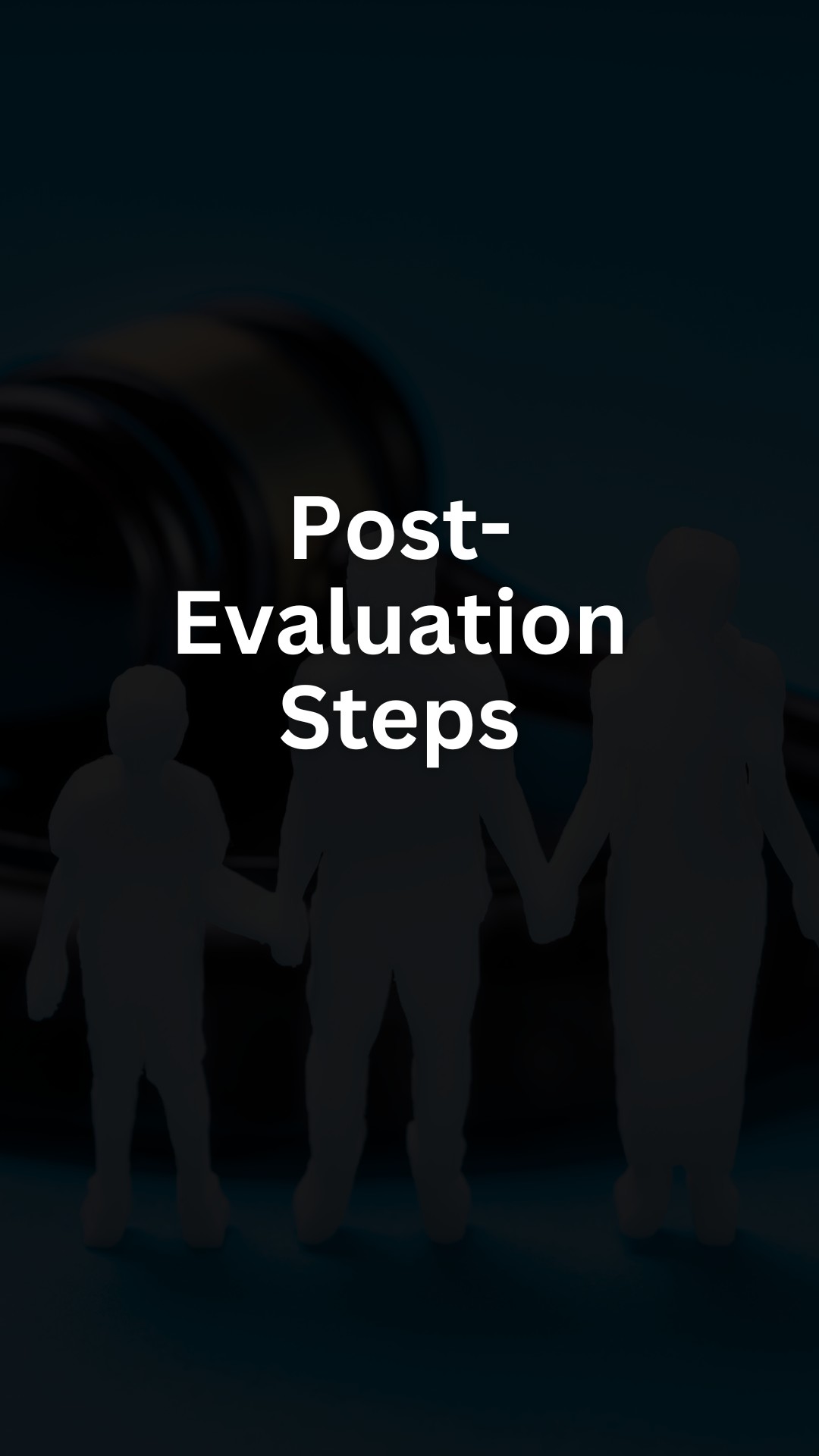
After the child custody evaluation, understanding the evaluator’s report and knowing your legal options are crucial.
Reviewing the Evaluator’s Report
First, read the evaluator’s report carefully.
Pay close attention to the recommendations, as they often influence the court’s decision.
Look for key points about your child’s welfare, what living arrangements are best, and any concerns raised.
Take notes on any parts you don’t understand and share these with your lawyer.
Next, ensure that the report reflects what happened during the evaluation.
If there are mistakes or if you disagree with some points, make a list and discuss them with your lawyer.
Accuracy is crucial because the court will rely heavily on this report.
Legal Recourses After Evaluation
If you disagree with the evaluator’s findings, you can take certain legal steps.
First, you may request a meeting with the evaluator to clarify points or correct mistakes.
If that doesn’t help, you could ask for a second evaluation.
This requires court approval and may not always be granted.
Finally, discussing your concerns with your lawyer helps you decide whether to challenge the report in court.
Your lawyer can guide you on presenting your case effectively. This might involve gathering additional evidence or calling witnesses.
Frequently Asked Questions

During a child custody evaluation, several factors and processes are crucial. Understanding these can help you navigate the situation more effectively.
What factors do custody evaluators consider during home visits?
Evaluators look at the child’s living conditions, the relationship between the child and the parent, and the overall home environment.
They assess safety, cleanliness, and suitability for raising a child.
What qualifications are necessary to become a child custody evaluator?
Custody evaluators usually need a background in psychology, social work, or a related field.
They often have advanced degrees and must be licensed or certified in their field. Experience in family law cases is also important.
How can the effectiveness of a custody evaluation be determined?
Effectiveness can be measured by how well the evaluation addresses the best interests of the child.
This includes considering the child’s needs, the parents’ ability to meet those needs, and providing clear, unbiased recommendations.
Under what circumstances can a custody evaluation be dismissed?
A custody evaluation can be dismissed if it is proven to be biased, incomplete, or not conducted by a qualified professional.
Procedural errors and lack of adherence to ethical guidelines can also lead to dismissal.
What are common mistakes to avoid during a custody battle?
Avoid speaking negatively about the other parent in front of the child or evaluator.
Do not fail to comply with court orders or miss appointments.
Stay focused on your child’s needs rather than your personal grievances.
How should one conduct themselves during co-parenting to avoid negatively impacting custody decisions?
Maintain open, respectful communication with your co-parent. Avoid conflicts and demonstrate your commitment to creating a stable, loving environment for your child.
Show cooperation and flexibility in addressing your child’s needs.